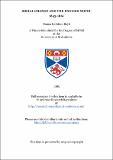Social change and the English novel 1843-1861
Abstract
The nineteenth century was a period of turbulent change, marked by the growth of large cities, factories and the railway. Led by an enterprising middle class Britain became the 'workshop of the world'. The new conditions produced enormous wealth but at the same time also created an impoverished working class which was forced to labour for long hours in the factory and to live in the cheapest dwellings where the lack of sanitary provisions contributed to the spreading of disease. The gross inequalities between the rich and poor, expressed by the phrase the 'two nations', became the focus of a national debate. This thesis discusses the work of five writers who responded to the social and ethical implications of industrialism; Thomas Carlyle, the foremost of Victorian sages, and four novelists - Benjamin Disraeli, Mrs. Gaskell, Charles Kingsley and Charles Dickens. In the first chapter I discuss the process whereby Britain became the first industrial nation and try to place these writers in a proper historical context. The ideas and influence of Thomas Carlyle are explored in Chapter Two. Carlyle is an important thinker because he was one of the first Victorians to address those problems of industrialism which he termed the 'condition of England' question. Part of the argument of my thesis is to demonstrate the extent of Carlyle's influence, which explains why he receives special attention throughout this work. Chapter Three examines Disraeli's trilogy Coningsby, Sybil and Tancred, discussing the way he saw and presented the working class and sought to develop a new role for the aristocracy in nineteenth century Britain. Chapter Four examines two novels by Mrs. Gaskell, Mary Barton and North and South; there it is argued that Mrs. Gaskell's Unitarian views and her position as a minister's wife allowed her to present the poor more sympathetically than any other of the social novelists. Charles Kingsley came to consider the 'condition of England' question through his involvement with the Christian Socialist movement and from his parish work in Eversley. His novels Yeast and Alton Locke have the added interest of dealing with both the rural and the urban poor, and are studied in Chapter Five. Dickens's novels all deal with social questions in varying degrees. In Chapter Six I examine Hard Times, his most direct attempt to deal with industrial society, and great Expectations, which deals most profoundly with the question of wealth and success in relation to the moral character of mid-Victorian society. In the conclusion I try to assess the ability of these middle class writers to come to grips with working class life, and to establish the impact they had on their contemporaries.
Type
Thesis, MPhil Master of Philosophy
Collections
Items in the St Andrews Research Repository are protected by copyright, with all rights reserved, unless otherwise indicated.

